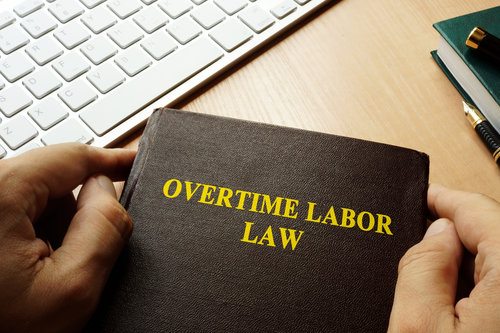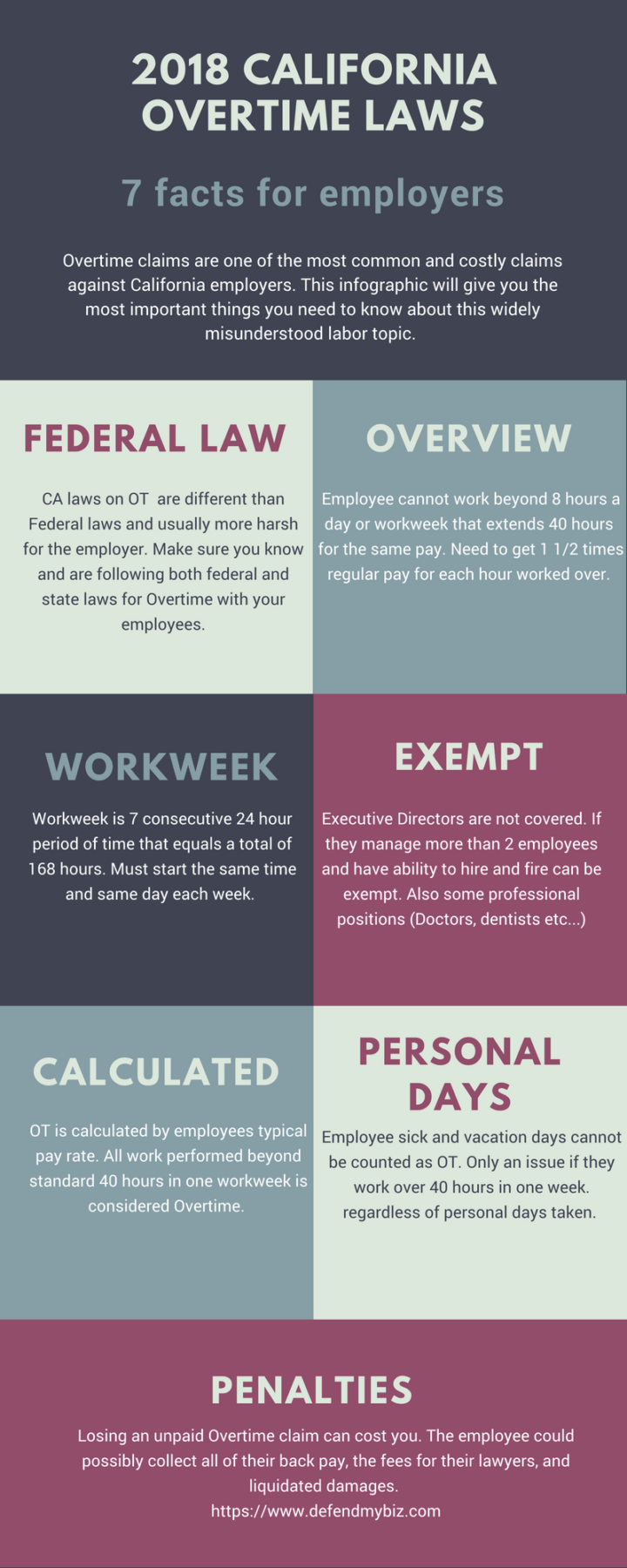
Posted on January 29th, 2018
As an employer, one of the most common labor issues to come up with your employees are the ones involving California overtime laws. That is why when we talk about employer rights in California we always make sure to
If you’re a California business owner you might feel overwhelmed by all the employment laws and labor regulations you need to comply with, specifically California overtime law.
However, failing to comply with California overtime law can be tricky and can cost you a lot of money if an employee files a claim or takes you to court. At worst, you can lose your business.
That’s why it’s so important for you to know California overtime law. Before an employee who knows the laws files a claim or lawsuit against you, know the facts.
We have worked with many different companies like Let’s Hibachi in Los Angeles.
ATTENTION California Employers!
Are you frustrated with California Labor Laws?
Join our FREE Facebook Group
The Official California Employer & Business Rights Group
This is a place for California Business owners to come together and do something about the crazy labor laws killing our business!
Quick Guide: California OT Law Infographic:
We put together this InfoGraph for you (below is the full article)
Want to Share this image on your site? Copy/Paste Code Below:
Here is the full article on Seven things you should know about 2018 California Overtime laws that should help avoid a painful and expensive legal dispute.
1. It’s Different Than Federal Overtime Law
Surprise, surprise, California employment law is even more advantageous to employees than federal law.
They cause stricter compliance regulations and obligations to business owners.
In fact, California leads the way in pro-employee labor laws.
For this reason you want to make sure you are not only familiar with the Federal overtime laws but also the more stringent California overtime laws.
2. Overview of California Overtime Law
California non-exempt employees cannot work beyond eight hours per day or a work week that extends 40 hours for the same pay.
Employees need to receive 1 1/2 times the regular pay rate for each hour worked more than eight hours or more than a 40-hour work week.
Eight hours of work in one day comprise a workday and any work beyond eight hours in a day or beyond six days in a week needs to be compensated as overtime.
Here’s how it works:
Employers must compensate employees one and a half times the worker’s regular pay rate for the hours worked beyond eight hours up to that include 12 hours in a workday. Or, they must compensate for the first eight hours worked on the seventh successive day in a row, during the work week.
Employers must double an employee’s regular rate of pay after the employee has worked 12 consecutive hours in one workday or eight days in a workweek.
3. What Constitutes a Workweek?
In California, a workweek is seven consecutive 24-hour period of time that equals a total of 168 hours. It must start the same time and the same day each week.
The week can start at any hour of the day as long as the days are the same and consecutive.
Once instituted, an employer may not change the beginning of the workweek to avoid paying overtime unless the schedule adjustment is permanent.
4. What Employees Are Not Covered by California Overtime Law?
Executive directors are not included.
That’s because they make more than double the minimum wage. You are considered an executive director if you manage a company or department with over two employees and have the ability to hire employees, review their work and terminate employees.
Administrative employees who do not perform manual labor but need special training and choose their own hours are also exempt from 2018 California Overtime Laws.
Other employees that are exempt from these laws include professional employees who do not require supervision, work manual labor, or choose their own hours and earn double the minimum wage.
They can include but are not limited to doctors, dentists, architects, engineers, teachers, actors, journalists, and nurses.
5. How California Overtime Law is Determined
Overtime law is calculated by an employee’s typical pay rate.
If you pay your employee a salary annually and not by the hour and is eligible to receive overtime, divide the annual salary by 52 weeks and then by 40 hours in the workweek.
Another way to explain it. All work performed beyond the standard of 40 hours in one workweek is considered overtime. So this has to be paid at rate of one and a half times (1.5X) your employee’s regular pay rate.
6. Vacation Days and Sick Days Cannot Be Counted Toward Overtime
When an employee takes a sick day or vacation day, these hours cannot be counted as overtime.
If your employee worked 48 hours in one week but they took off eight hours within the week they cannot receive overtime since they didn’t work over 40 hours.
Bonuses like holiday bonuses cannot be counted toward overtime because they’re considered as separate than an employee’s normal pay rate.
However, non-discretionary bonuses that are based on the number of hours worked are included in calculating overtime since they are considered part of your employees’ normal pay rate.
7. What Can Employees Recover From Violations
Financial recovery of funds can differ depending on whether claims are filed under FSLA laws or California State laws.
Under FSLA laws, an employee who provides evidence can recover a multitude of fees, including back pay, lawyer fees, liquidated damages and what is known as injunctive relief.
Liquidate damages must be awarded unless you can prove you have acted in good faith and the denial of overtime did not violate FSLA laws. In this case, the court may award a reduced amount in damages.
California’s law’s definition can be more complex than FSLA because it provides a broader definition of overtime laws and provides additional protection.
However, it will not award liquidated damages. As a substitute, Labor Code section 1194 will provide interest, back pay, attorney fees and other costs in the lawsuit.
The Takeaway from California Overtime Law
Now you know seven essential factors you need to know about California overtime law.
- California overtime law differs From federal overtime law
- Some employees are not covered by overtime law in California
- Vacation days and sick days cannot be counted as overtime
- How to calculate overtime
- Executive, administrative and professional job titles can be excluded from laws
- Which bonuses are exempt from overtime laws and which are included
- Financial recovery of funds depend on which FSLA or California state law claims are filed
- Employees can attempt to recover back pay, attorney fees, liquidated damages and injunctive relief
- Your fees can be reduced if you can prove you acted in good faith and did not violate FSLA laws
Our California law firm protects and defends California employers in labor and employee issues, including California overtime laws, wrongful termination disputes, workers compensation defense, sexual harassment claims, severance agreements and more.
Contact us today to get help.
ATTENTION California Employers!
Are you frustrated with California Labor Laws?
Join our FREE Facebook Group
The Official California Employer & Business Rights Group
This is a place for California Business owners to come together and do something about the crazy labor laws killing our business!



